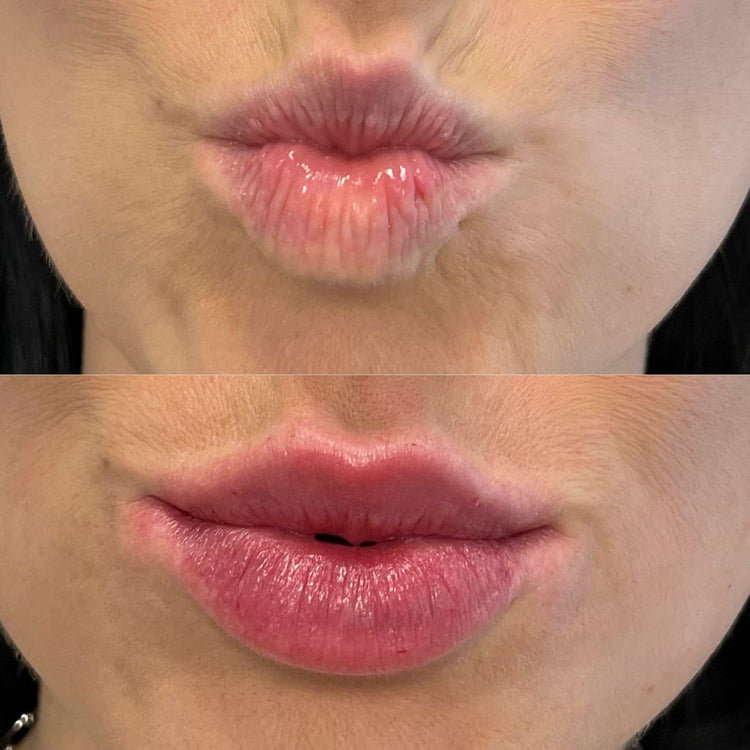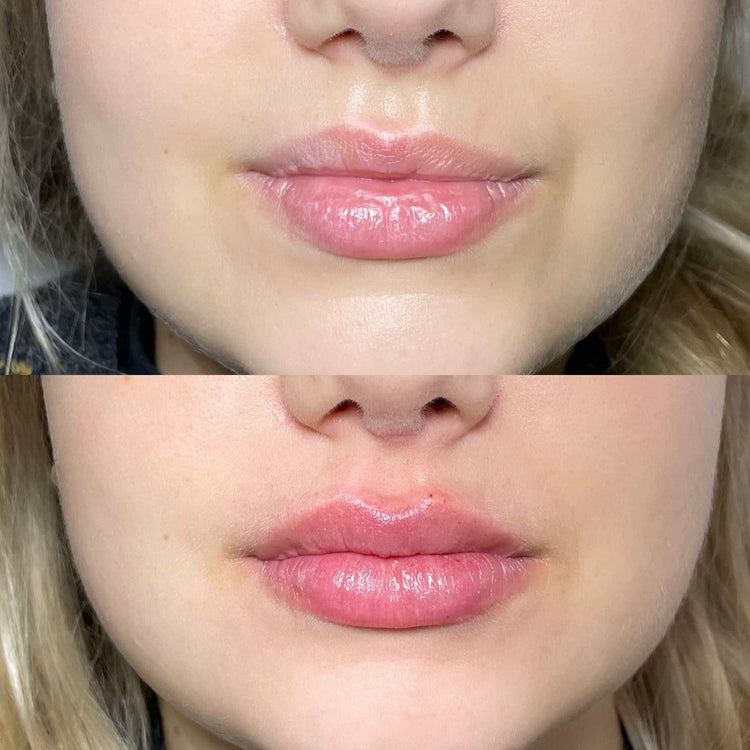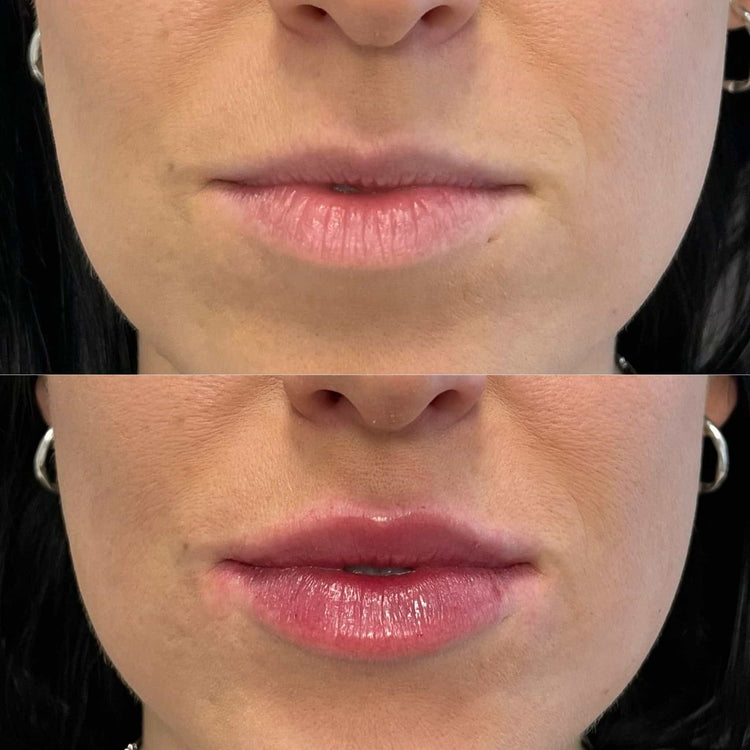Pre-Treatment Preparation
Preparing for your lip filler appointment ensures you have the best possible experience and achieve desired results.
Hydration
Proper hydration is crucial in the days leading up to your appointment. Drinking plenty of water helps plump the lips naturally, making them appear fuller and enhancing the effects of the filler.
Avoiding alcohol and caffeine beforehand can also contribute to better results, as these substances can dehydrate the body.
Avoid Certain Medications
To optimize your lip filler experience, certain medications should be avoided prior to your appointment. Aspirin, ibuprofen, and other blood thinners increase the risk of bruising and bleeding during the procedure. Additionally, anti-inflammatory drugs like Advil or Aleve can interfere with the filler’s effectiveness.
It’s essential to consult with your doctor or aesthetic professional about any medications you’re taking, including supplements, to ensure they won’t negatively impact the treatment.
Limit Alcohol Consumption
Preparing for your lip filler appointment ensures you have the best possible experience and achieve desired results.
Proper hydration is crucial in the days leading up to your appointment. Drinking plenty of water helps plump the lips naturally, making them appear fuller and enhancing the effects of the filler.
Avoiding alcohol and caffeine beforehand can also contribute to better results, as these substances can dehydrate the body.
- Limit alcohol consumption a few days before your appointment
Avoid Blood Thinners
To optimize your lip filler experience, certain medications should be avoided prior to your appointment. Aspirin, ibuprofen, and other blood thinners increase the risk of bruising and bleeding during the procedure.
Additionally, anti-inflammatory drugs like Advil or Aleve can interfere with the filler’s effectiveness.
At the Appointment
Preparing for your lip filler appointment ensures you have the best possible experience and achieve desired results.
Proper hydration is crucial in the days leading up to your appointment. Drinking plenty of water helps plump the lips naturally, making them appear fuller and enhancing the effects of the filler.
Avoiding alcohol and caffeine beforehand can also contribute to better results, as these substances can dehydrate the body.
To optimize your lip filler experience, certain medications should be avoided prior to your appointment. Aspirin, ibuprofen, and other blood thinners increase the risk of bruising and bleeding during the procedure.
Additionally, anti-inflammatory drugs like Advil or Aleve can interfere with the filler’s effectiveness.
Communicate Your Desired Outcome
When you arrive at your appointment, clearly communicate your desired outcome to the injector. Bring reference photos of lip shapes you admire to help them understand your vision. Discuss any concerns or anxieties you have about the procedure and don’t hesitate to ask questions to ensure you feel comfortable and confident.
Discuss Allergies and Medical History
When discussing allergies at your appointment, be sure to inform the injector of any known allergies to medications, injectables, or substances used in the lip filler process. This includes latex allergies, as some needles and other materials might contain latex.
Additionally, provide a comprehensive overview of your medical history, including any past surgeries, skin conditions, or autoimmune disorders. This information helps the injector assess potential risks and make informed decisions about your treatment plan.
Understand the Procedure
Preparing for your lip filler appointment ensures you have the best possible experience and achieve desired results.
Proper hydration is crucial in the days leading up to your appointment. Drinking plenty of water helps plump the lips naturally, making them appear fuller and enhancing the effects of the filler.
Avoiding alcohol and caffeine beforehand can also contribute to better results, as these substances can dehydrate the body.
- Limit alcohol consumption a few days before your appointment
To optimize your lip filler experience, certain medications should be avoided prior to your appointment. Aspirin, ibuprofen, and other blood thinners increase the risk of bruising and bleeding during the procedure.
Additionally, anti-inflammatory drugs like Advil or Aleve can interfere with the filler’s effectiveness.
When you arrive at your appointment, clearly communicate your desired outcome to the injector. Bring reference photos of lip shapes you admire to help them understand your vision. Discuss any concerns or anxieties you have about the procedure and don’t hesitate to ask questions to ensure you feel comfortable and confident.
When discussing allergies at your appointment, be sure to inform the injector of any known allergies to medications, injectables, or substances used in the lip filler process. This includes latex allergies, as some needles and other materials might contain latex.
Additionally, provide a comprehensive overview of your medical history, including any past surgeries, skin conditions, or autoimmune disorders. This information helps the injector assess potential risks and make informed decisions about your treatment plan.
Ask About Aftercare Instructions
At your appointment, be sure to ask about aftercare instructions in detail.
These instructions will outline how to care for your lips following the procedure to ensure proper healing and minimize the risk of complications such as swelling, bruising, or infection.
Be sure to understand how long you need to avoid certain activities, like strenuous exercise or applying makeup to the treated area.
Post-Treatment Care
Proper aftercare is essential for optimal results and a smooth recovery process following your lip filler appointment. Understanding and following your injector’s instructions carefully will help minimize any potential side effects and ensure your lips heal beautifully.
Ice and Compression
Post-treatment care is crucial for ensuring the best possible outcome from your lip fillers.
Your injector will provide specific instructions, but generally, applying ice packs wrapped in a towel for 10-15 minutes at a time, several times a day, can help reduce swelling and discomfort.
Compression using a soft bandage or silicone patches can also minimize swelling and promote healing.
Avoiding Makeup and Sun Exposure
Post-treatment care is crucial for ensuring the best possible outcome from your lip fillers.
Your injector will provide specific instructions, but generally, applying ice packs wrapped in a towel for 10-15 minutes at a time, several times a day, can help reduce swelling and discomfort.

Compression using a soft bandage or silicone patches can also minimize swelling and promote healing.
Avoid direct sun exposure and tanning beds for at least two weeks following your treatment, as this can irritate the treated area and increase the risk of pigmentation changes.
It’s also essential to avoid applying makeup to the treated area for the first few days to allow the lips to heal properly and prevent infection.

Managing Swelling and Bruising
Post-treatment care is crucial for ensuring the best possible outcome from your lip fillers.
Your injector will provide specific instructions, but generally, applying ice packs wrapped in a towel for 10-15 minutes at a time, several times a day, can help reduce swelling and discomfort.
Compression using a soft bandage or silicone patches can also minimize swelling and promote healing.

Avoid direct sun exposure and tanning beds for at least two weeks following your treatment, as this can irritate the treated area and increase the risk of pigmentation changes.
It’s also essential to avoid applying makeup to the treated area for the first few days to allow the lips to heal properly and prevent infection.
Follow Up Appointments
After your lip filler appointment, it’s essential to follow your injector’s post-treatment care instructions carefully. These instructions will outline how to minimize swelling, promote healing, and reduce the risk of complications.
Applying ice packs wrapped in a towel for 10-15 minutes at a time, several times a day, can help reduce swelling and discomfort. Compression using a soft bandage or silicone patches can also minimize swelling and promote healing.
Avoid direct sun exposure and tanning beds for at least two weeks following your treatment as this can irritate the treated area and increase the risk of pigmentation changes. It’s also important to avoid applying makeup to the treated area for the first few days to allow the lips to heal properly and prevent infection.
Schedule follow-up appointments with your injector as instructed. These appointments allow the injector to monitor your progress, address any concerns you may have, and ensure you are healing properly. They will also assess the results of the treatment and determine if any additional sessions are necessary to achieve your desired outcome.
By following these post-treatment care guidelines and attending your follow-up appointments, you can maximize the longevity and beauty of your lip filler results.
Learn more about lip fillers and the process with Dr. Laura Geige at It’s Me & You Clinic
- Xela Rederm Skin Booster Treatments Near Tatsfield, Surrey - January 14, 2026
- Xela Rederm Skin Booster Treatments Near Ewhurst, Surrey - January 12, 2026
- Why Weed Drinks Are The Future Of Cannabis - January 11, 2026
